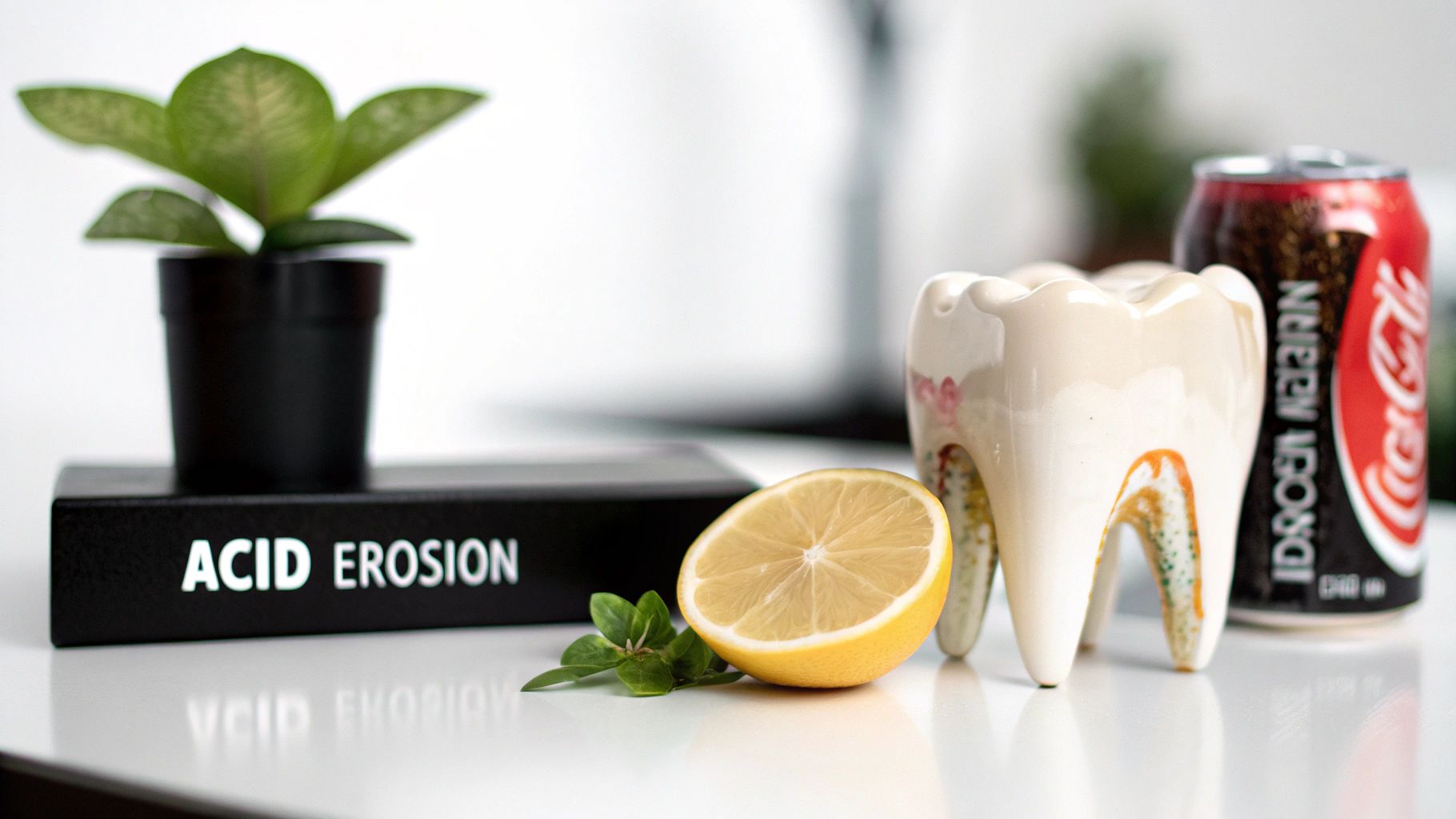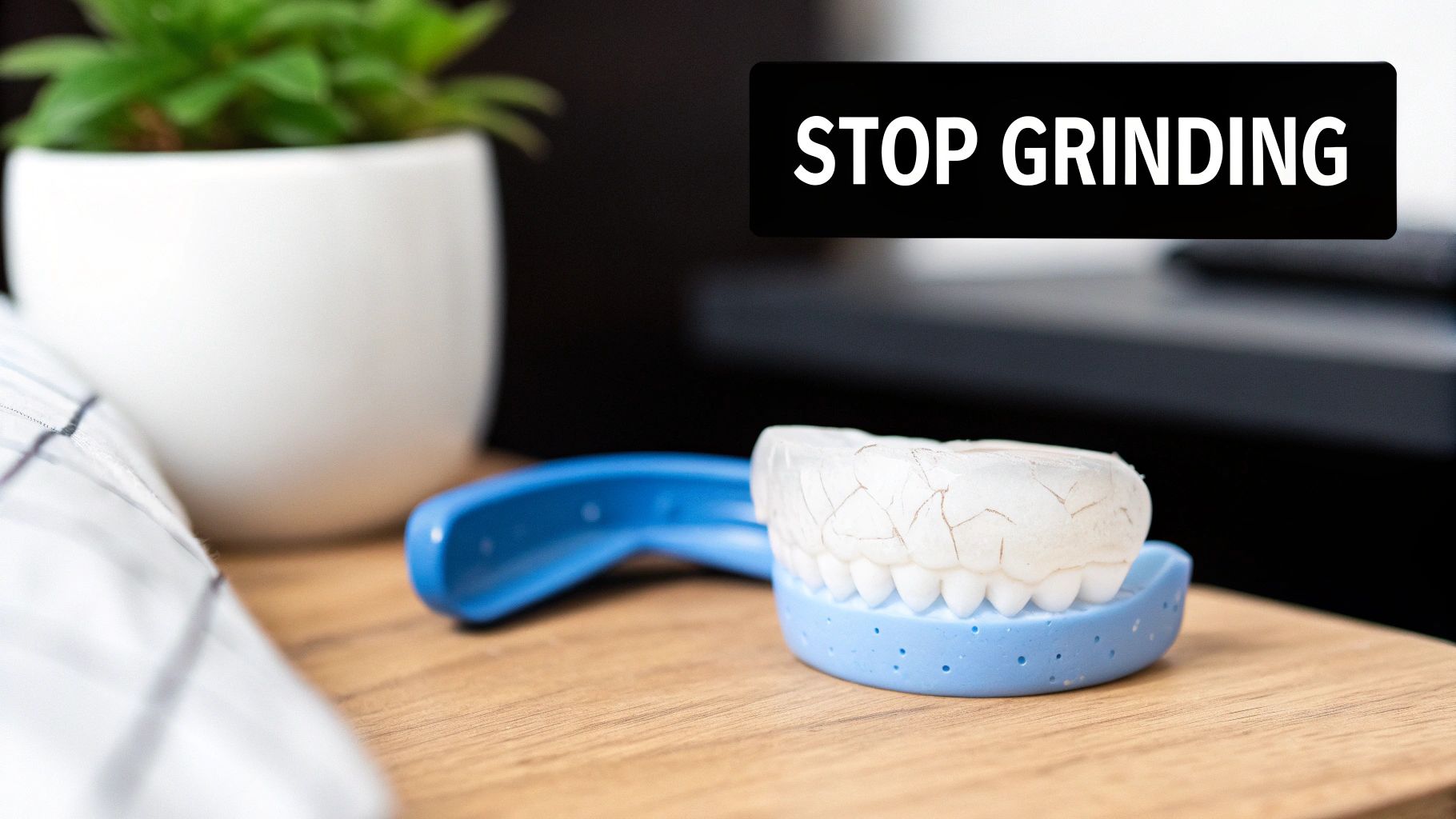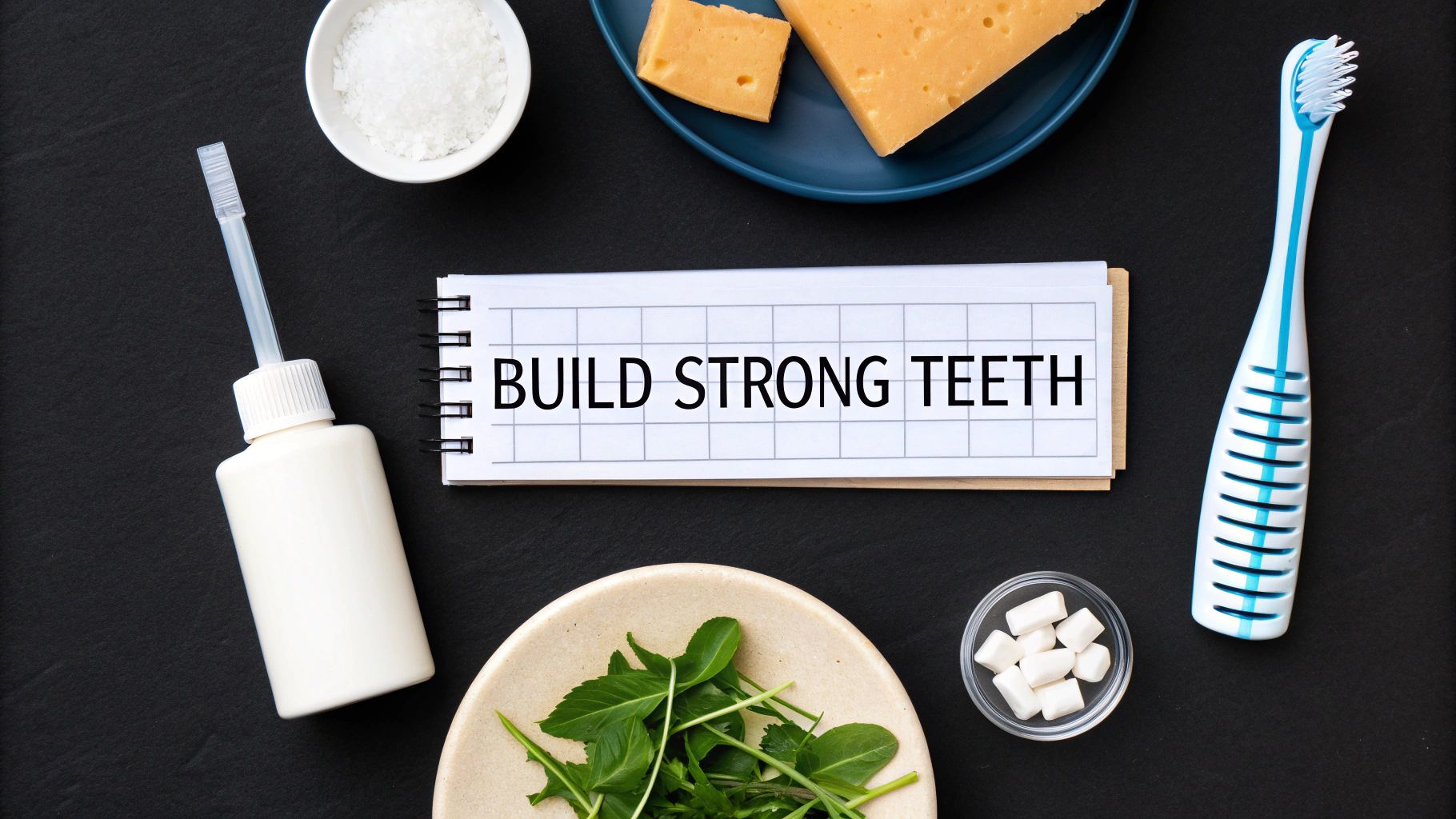Why Do My Teeth Chip So Easily? An Actionable Guide to Prevention
- Caterina Rutter
- Nov 8, 2025
- 13 min read
It’s a frustrating feeling, isn't it? You run your tongue over your teeth and notice another tiny chip. That chip isn't the result of one single bite, but a clear sign that your teeth's natural defenses have been worn down.
The real problem lies with weakened enamel, which is your tooth's incredibly strong, protective outer layer. When that natural armor is thinned out by things like acidic foods, the constant pressure from grinding, or even gaps in your nutrition, your teeth are left exposed and much more likely to get damaged.
Understanding Why Your Teeth Are Chipping
A chipped tooth always feels sudden, but the weakness that caused it often builds up silently over months or even years. Think of your tooth enamel like the tempered glass on your phone screen. When it's new and thick, it can take a lot of punishment. But once it gets thin or develops tiny, invisible cracks, even a small bump can cause it to shatter.
That's exactly what happens in your mouth. This gradual breakdown is why the problem seems to pop up out of nowhere.
Several key factors conspire to weaken this protective layer, but one of the biggest is enamel erosion from tooth decay. It's a huge issue worldwide. Global studies show that oral diseases affect a staggering 3.5 billion people. Dental caries (the technical term for tooth decay) is the single most common culprit and a major reason enamel loses its strength. You can dive deeper into these global dental care statistics to see just how widespread the problem is.
The Main Culprits Behind Weakened Enamel
So, what’s really going on behind the scenes? To get a clearer picture of why your teeth might be chipping, it helps to see the primary causes in action. This infographic does a great job of breaking down the three most common ways our enamel takes a hit.
As you can see, it really boils down to three main offenders: acid erosion, physical grinding, and a lack of the right nutrients from the inside out. Together, these issues create the perfect storm for chips, cracks, and fractures to happen.
Figuring out which of these are at play is the first real step you can take toward building a stronger, more resilient smile. Once you identify the root causes, you can start putting a solid prevention plan in place.
Key Takeaway: Chipped teeth aren't just bad luck. They're a red flag that your enamel is compromised. The only way to stop it from happening again is to address the underlying cause, whether that’s your diet, a grinding habit, or your nutritional intake.
The Hidden Damage From Everyday Foods and Drinks

It’s easy to blame a chipped tooth on a single event, like biting down on an ice cube or a stray popcorn kernel. The truth, however, is often much more subtle. For many of us, the real culprit is the slow, silent erosion caused by the foods and drinks we enjoy every single day. If you’ve ever wondered, "why do my teeth chip so easily?" the answer often starts right here.
Imagine your tooth enamel is like a stone statue. A single drop of rain does nothing, but a steady, years-long acid rain will eventually wear down even the strongest marble. That’s exactly what happens when your teeth are constantly exposed to acidic things like citrus fruits, coffee, sodas, and even some salad dressings. They gradually soften and dissolve the vital minerals that make your enamel tough.
Your body does have a natural defense system. Your saliva works around the clock to neutralize these acids and rebuild the enamel in a process called remineralization. But when your teeth are constantly bathed in acid, your saliva just can't keep up. The enamel gets thinner, weaker, and far more likely to chip from normal use.
The Amplifying Effect of Stomach Acid
Dietary acid is one thing, but for some, a far more powerful threat comes from within. Conditions like acid reflux, also known as Gastroesophageal Reflux Disease (GERD), can bring potent stomach acid into your mouth, especially while you're lying down to sleep.
This internal acid is much more corrosive than anything you’d typically eat or drink, dramatically speeding up enamel erosion. If you suspect you have reflux, speak with your doctor. Managing this condition is a critical step in protecting your teeth from severe, rapid erosion.
Actionable Insight: Protecting your enamel isn't just about cutting out certain foods. It’s about managing how and when you consume them. The real goal is to give your saliva enough time to do its job and repair the daily wear and tear.
Common Dietary Acids and Their Impact on Enamel
It's helpful to know which common foods and drinks pose the biggest threat. Below is a quick guide to their acidity levels and what you can do to minimize their impact.
Food/Drink Item | Acidity Level (pH) | Actionable Tip to Reduce Harm |
|---|---|---|
Lemon Juice | 2.0 - 2.6 | Always dilute with water. Never suck on lemon wedges. |
Soda (e.g., Cola) | 2.5 - 3.5 | Use a straw and drink it with a meal, not by itself. |
Wine (Red & White) | 3.0 - 3.8 | Sip water alongside your wine to rinse your teeth. |
Orange Juice | 3.3 - 4.2 | Drink it quickly instead of sipping over a long period. |
Coffee (Black) | 5.0 | Avoid adding sugar, which feeds acid-producing bacteria. |
Understanding these numbers helps you make smarter choices without having to give up everything you enjoy.
Practical Strategies to Minimize Acid Damage
You don't have to overhaul your entire diet to protect your teeth. It’s all about small, strategic habits that can make a huge difference over time. Here are a few simple tips that I always share with my patients:
Rinse with Water: After having something acidic like coffee or a glass of OJ, just swish your mouth with plain water. This simple move immediately neutralizes the acid and washes it away before it can do much harm.
Wait Before You Brush: It's tempting to brush right after a meal, but that's one of the worst things you can do if you've had something acidic. Your enamel is soft, and brushing will just scrub it away. Wait at least 30 to 60 minutes to give your saliva time to remineralize your teeth first.
Use a Straw: When you're drinking acidic beverages like soda, iced tea, or sports drinks, a straw is your best friend. It helps the liquid bypass most of your teeth, dramatically reducing direct acid contact.
Pair Foods Wisely: Turn acidic foods into team players. For example, eating cheese (which is alkaline) after a glass of wine can help neutralize the acid right away. This smart pairing lets you enjoy your food while still protecting your teeth.
How Nightly Teeth Grinding Creates Microfractures

Do you ever wake up with a sore jaw, a dull tension headache, or teeth that feel strangely sensitive? If so, you might be dealing with bruxism, the clinical term for grinding or clenching your teeth. While some of us clench our jaws during a stressful day at work, it’s the grinding that happens at night that often causes the most damage—precisely because we’re fast asleep and have no idea it’s happening.
Your jaw muscles are among the strongest in your body, capable of generating hundreds of pounds of force. When you're asleep, this incredible pressure can be applied over and over, putting your teeth under stresses they would never encounter from just chewing food.
This intense, sustained force rarely breaks a tooth clean off in one go. Instead, it creates a network of tiny, often invisible cracks in your enamel known as microfractures. It’s a lot like a small stone hitting a car windshield. The glass doesn't shatter right away, but a web of tiny fractures spiders out, compromising the whole pane. Over time, these microfractures weaken your teeth from the inside out, leaving them vulnerable to chipping from the most ordinary activities.
The Difference Between Grinding and Clenching
While both fall under the umbrella of bruxism, these two habits affect your teeth in slightly different ways. Figuring out which one you do can offer clues as to why your teeth seem to chip so easily.
Grinding: This is the classic side-to-side scraping motion of the top and bottom teeth. It tends to wear down the chewing surfaces, making molars look flat and front teeth appear shorter.
Clenching: This is more of a static habit—just biting down hard and holding the jaw tight. Clenching is notorious for creating vertical microfractures and putting a ton of stress on just a few teeth at a time.
No matter the motion, the end result is the same: a weakened tooth structure that's just waiting for a reason to break. Interestingly, a major contributor to nighttime grinding can be sleep apnea. If you'd like to learn more about sleep apnea and its dental impact, experts have found that the body may clench the jaw reflexively to reopen a closing airway during sleep.
Key Insight: Nightly grinding subjects your teeth to prolonged, excessive force that they were never built to withstand. The resulting microfractures are the hidden culprits that explain why a harmless bite of food can suddenly cause a very noticeable chip.
Your Most Important Line of Defense
Protecting your smile from the nightly grind is one of the best things you can do to prevent chips. While managing stress can certainly help with daytime clenching, the most reliable way to stop sleep bruxism in its tracks is with a custom-fitted night guard from your dentist.
Unlike the boil-and-bite guards from the drugstore, a custom appliance is molded to the exact contours of your mouth. It acts as a protective buffer, absorbing the grinding forces and creating a physical barrier between your upper and lower teeth. This simple device is an invaluable investment in preserving your enamel for the long haul.
For a deeper look at solutions, check out our guide on how to prevent teeth grinding at night.
Connecting Your Overall Health to Stronger Teeth
When you find yourself wondering, "Why do my teeth chip so easily?" the answer often goes beyond just diet or grinding. It frequently traces back to your overall health. Think of it this way: you can't build a sturdy house with poor-quality materials. In the same way, your body can't construct resilient tooth enamel if it doesn't have the right internal resources.
Strong teeth are quite literally built from the inside out. Your body needs a steady stream of specific minerals and vitamins to form and maintain that hard, dense enamel. When those foundational elements are missing, the tooth structure is compromised from day one, leaving it more porous and much more susceptible to damage.
The Nutritional Building Blocks of Your Enamel
Your teeth aren't static objects; they're in a constant state of flux, losing and regaining minerals every single day. To come out on top in this mineral tug-of-war, your body needs a strong nutritional defense. The most critical players here are:
Calcium: This is the headline mineral that gives your teeth and bones their fundamental hardness and structure.
Phosphorus: Working hand-in-hand with calcium, phosphorus is absolutely essential for repairing and rebuilding tooth enamel.
Vitamin D: This vitamin is like the key that unlocks calcium's power, allowing your body to actually absorb and use it effectively.
A deficiency in any one of these can lead to enamel that's poorly formed or inherently weak, leaving your teeth vulnerable. For a deeper dive into what your diet needs, check out our guide to the 5 best vitamins for your teeth and gums.
When Your Body's Systems Weaken Your Smile
Beyond basic nutrition, certain systemic health conditions can directly sabotage your dental strength. For example, conditions that affect bone density, like osteoporosis, don't just impact your hips and spine. They can also reduce the density of your jawbone, the very foundation that anchors your teeth. A weaker jaw means less stable support, which can increase the risk of tooth loss and other complications.
Another major—and often overlooked—culprit is dry mouth, known clinically as xerostomia. Saliva is your mouth’s unsung hero. It works around the clock to neutralize acid, wash away food particles, and redeposit those essential minerals back onto your enamel.
It's shocking how many common medications list dry mouth as a primary side effect. This drop in saliva production strips your teeth of their most important natural defense, creating an environment where acid damage and decay can run rampant, leading to weaker, chip-prone teeth.
Nutritional gaps and systemic issues are not rare problems. It's estimated that 30% of people worldwide have a nutritional deficiency that can impact their oral health. On top of that, roughly 400 common medications are known to cause the kind of dry mouth that cripples your enamel's ability to repair itself. Taking control of these whole-body influences is a critical, non-negotiable step toward achieving truly resilient teeth.
Your Action Plan for Building Stronger Teeth

Knowing why your teeth are chipping is one thing, but turning that knowledge into action is what will actually save your smile. Think of this section as your personal playbook for building stronger, more resilient teeth, starting today. With just a few key habits, you can tip the scales from gradual weakening to consistent strengthening.
The aim here is to get proactive. Instead of just reacting to chips and cracks after they happen, you'll be creating an environment in your mouth where teeth are naturally tougher and ready for whatever life throws at them.
Master Your Brushing Technique
It might sound basic, but one of the biggest mistakes I see is people brushing way too hard. The idea that more pressure equals cleaner teeth is a myth that can seriously wear down your precious enamel. The real secret is to be gentle but thorough.
Use a Soft-Bristled Brush: Your toothbrush doesn't need to be stiff to work. A soft-bristled brush is more than enough to remove plaque effectively without scratching up your enamel or causing your gums to recede.
Angle at 45 Degrees: Hold your brush at a 45-degree angle to your gum line. This simple trick helps the bristles sweep away plaque from both the tooth surface and that tricky spot right under the gums.
Use Gentle, Circular Motions: Ditch the aggressive back-and-forth sawing motion. Instead, use short, gentle circles. It's far more effective and won't damage your teeth in the long run.
Your technique is half the battle; the products you use are the other half. Fluoride is a game-changer because it helps remineralize your enamel, basically patching up weak spots before they become full-blown chips. A daily fluoride toothpaste and mouth rinse is an incredibly simple and powerful way to fortify your teeth.
Fuel Your Smile with a Tooth-Building Diet
Just like your muscles need protein to grow, your teeth need specific nutrients to stay strong and solid. When you pack your diet with enamel-strengthening foods, you’re giving your body the raw materials it needs to constantly repair and rebuild your teeth.
Actionable Tip: A stronger smile starts on your plate. A diet rich in calcium, phosphorus, and vitamin D isn’t just good for your bones—it’s the foundation for tough, chip-resistant tooth enamel.
Here's a quick checklist of foods that work hard for your smile:
Dairy Products: Milk, cheese, and yogurt are loaded with calcium and phosphates, the very building blocks of your enamel. Cheese is a double-win because it also helps neutralize acid in your mouth.
Leafy Greens: Think spinach and kale. They're high in calcium and other vitamins that contribute to great oral health.
Crunchy Vegetables: Carrots and celery are like nature's toothbrushes. Chewing them scrubs away food particles and ramps up saliva production to rinse your mouth clean.
Nuts: Almonds are a fantastic, low-sugar source of both calcium and protein, making them a perfect snack for strong teeth.
On top of professional care, some natural additions can also give your teeth a boost. For instance, you could explore the oral care benefits of aloe juice. Ultimately, building a strong defense for your teeth is about combining smart food choices with excellent hygiene.
Professional Solutions to Repair and Protect Your Smile
When prevention isn't enough and a chip has already happened, it's time to see your dentist. The good news is that modern dentistry has some fantastic ways to not only fix the damage but also to beef up your tooth's defenses against future problems. Knowing what's available helps you and your dentist decide on the best path forward for your smile.
The right fix really comes down to where the chip is and how bad it is. Think of it like a crack in a wall—a tiny hairline fissure just needs a little spackle, but a gaping hole demands a more serious patch. Your teeth work the same way, and each treatment is designed for a specific kind of damage.
For Minor Chips: Dental Bonding
For those smaller, cosmetic chips that often happen to front teeth, dental bonding is usually the go-to solution. It's a quick and relatively simple fix where your dentist applies a tooth-colored composite resin to the damaged spot.
The dentist masterfully sculpts the material to match the natural contours of your tooth and then hardens it with a special light. The result is a repair so seamless you’ll have a hard time spotting it. Bonding is a great, minimally invasive option that can restore your tooth's look in just one visit.
For Aesthetic Upgrades: Veneers
If the damage is a bit more obvious or you’re hoping to give your entire smile a makeover, veneers are an amazing choice. A veneer is a super-thin, custom-made shell—typically made of porcelain—that gets bonded directly to the front of your tooth.
Veneers do more than just hide chips and cracks; they can also fix stubborn discoloration and even out minor misalignments, giving you a stunningly uniform smile. They provide a tough, stain-resistant surface that offers a long-term cosmetic boost while protecting the tooth underneath.
Key Takeaway: Fixing a chipped tooth is more than a cosmetic touch-up. A proper restoration gets rid of sharp edges that can harbor plaque and seals up weak points that could easily turn into much bigger fractures later on.
For Severe Damage: Dental Crowns
When a tooth has a major chip or fracture that threatens its very structure, a dental crown is its best defense. A crown is basically a custom-fitted cap that covers the entire visible part of the tooth, right down to the gumline.
This solution brings the tooth back to its original shape, size, and strength, so you can chew confidently without worrying about it breaking further. Crowns are truly the gold standard for saving a tooth that's too weak to stand on its own. For a deeper dive into all the possibilities, our guide on how to fix a new chipped tooth has even more information.
We've gone through the main culprits behind why teeth chip, but it's natural to still have some lingering questions. Let's tackle a few of the most common ones we hear from patients.
Can a Small Chip Heal Itself?
Unfortunately, no. Unlike a bone that can mend itself after a break, tooth enamel doesn't have the ability to regenerate. Once a piece of your tooth chips off, it's gone for good.
Even a tiny, seemingly harmless chip can create problems. It might leave a rough spot that snags your tongue or collects plaque, or it could create a weak point that eventually leads to a much bigger crack. That's why it's so important to have any chip, no matter how small, looked at by your dentist.
Do Teeth Get More Brittle with Age?
It's true that teeth can become more susceptible to damage as we get older. Think about it—decades of grinding, chewing, and biting take a toll, and our protective enamel layer can thin out over the years.
Many older adults also take medications that lead to dry mouth. This is a bigger deal than it sounds, as saliva is crucial for neutralizing acids and protecting your teeth. However, getting older doesn't automatically mean your teeth will be weak. Great oral hygiene and consistent dental check-ups can keep your smile strong for a lifetime.
A lot of patients ask if an electric toothbrush is a better choice for preventing chips. It certainly can be. Many models come with a pressure sensor that alerts you if you're brushing too hard, which is a fantastic feature for protecting your enamel from unnecessary wear.
At Beautiful Dentistry, our goal is to give you clear, honest answers and create a personalized plan to help you feel confident in your smile. If you're worried about chipped teeth or just want to be proactive about your dental health, we're here for you.
You can schedule a comprehensive exam with our team today at https://zdentist.com.

